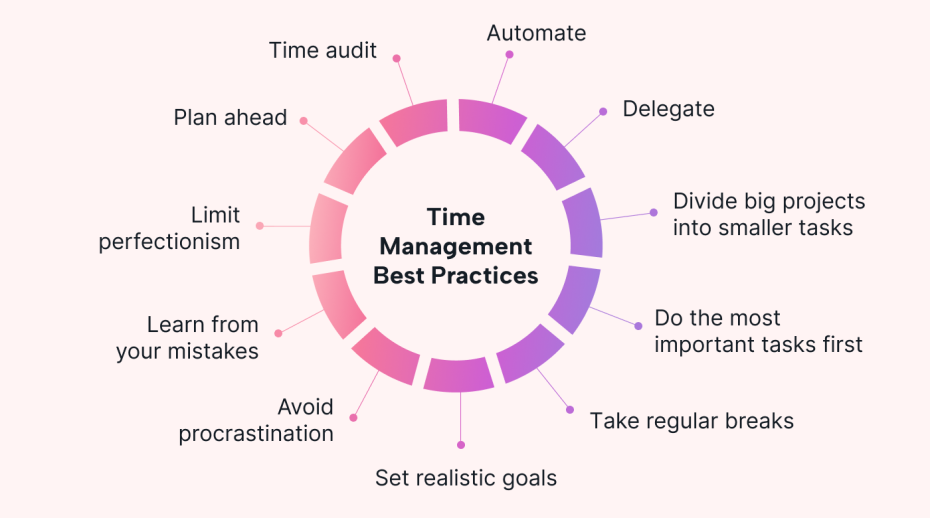Effective time management is one of the most sought-after skills in today’s fast-paced world. With so many distractions and demands on our time, mastering the art of time management can significantly boost productivity and help achieve both personal and professional goals. Whether you’re a student, professional, or entrepreneur, learning how to manage your time efficiently can lead to improved focus, reduced stress, and enhanced success. In this article, we will explore the most practical and effective time management tips that can help you make the most of every day.
1. Prioritize Your Tasks with the Eisenhower Matrix
The Eisenhower Matrix is a time management tool that helps you prioritize tasks based on urgency and importance. It divides tasks into four categories:
-
Urgent and Important: Tasks that require immediate attention and are crucial for your success.
-
Not Urgent but Important: Tasks that are important for long-term success but don’t need to be done immediately.
-
Urgent but Not Important: Tasks that need to be done soon but don’t significantly contribute to your main goals.
-
Not Urgent and Not Important: Tasks that are distractions and can be eliminated or minimized.
By using this matrix, you can focus on what truly matters and avoid spending too much time on non-essential activities.
2. Time Blocking for Focused Work
Time blocking is a powerful technique where you allocate specific blocks of time for particular tasks or activities throughout your day. By assigning clear, uninterrupted time slots for work, meetings, and even rest, you can ensure that you stay focused on one thing at a time. This reduces multitasking and enhances your ability to concentrate, which leads to higher quality work in less time. Tools like Google Calendar or specialized time management apps can help you organize your day using time blocks.
3. Break Down Big Tasks into Smaller Steps
Large projects or tasks can often feel overwhelming, leading to procrastination. To avoid this, break down big tasks into smaller, manageable steps. This method, often referred to as “chunking,” makes the task seem less intimidating and helps you build momentum as you complete each small step. You’ll feel a sense of accomplishment as you progress, which can keep you motivated and moving forward.
4. Use the Pomodoro Technique for Better Focus
The Pomodoro Technique is a simple yet effective method for managing time and staying productive. It involves working in short bursts, typically 25 minutes, followed by a 5-minute break. After four Pomodoro sessions, you take a longer break of 15-30 minutes. This technique helps maintain high levels of focus while preventing burnout and mental fatigue. Apps like Focus Booster or Pomodone can help you keep track of your Pomodoro sessions.
5. Eliminate Distractions and Stay Organized
Distractions can derail even the best time management efforts. To minimize distractions, identify your biggest time-wasters and take proactive steps to avoid them. For instance, you can turn off notifications on your phone, close unnecessary tabs on your browser, or create a designated workspace free from distractions. Additionally, maintaining an organized environment—both physically and digitally—can help you stay focused and efficient.
6. Set SMART Goals for Clear Direction
Setting clear goals is essential for effective time management. The SMART goal framework is a popular method for setting specific, measurable, achievable, relevant, and time-bound goals. By setting SMART goals, you create a clear direction for your time and energy, making it easier to stay focused on what’s most important. Regularly review and adjust your goals to ensure that they align with your priorities and evolving needs.
7. Learn to Say No
One of the most important skills in time management is learning to say no. If you’re already overwhelmed with tasks, it’s essential to set boundaries and avoid taking on more responsibilities that don’t align with your goals. Saying no may be uncomfortable at first, but it’s necessary to protect your time and prevent burnout. Be assertive and prioritize your commitments to what truly matters.
8. Delegate Tasks When Possible
Delegation is a key time management strategy, especially in professional settings. If there are tasks that others can handle, don’t hesitate to delegate them. Delegating frees up your time to focus on more critical responsibilities and ensures that work gets done more efficiently. Trusting others with tasks also helps develop teamwork and improves overall productivity.
9. Track Your Time for Better Awareness
To improve your time management skills, it’s important to have a clear understanding of how you’re spending your time. Use time tracking tools like Toggl, RescueTime, or Clockify to track your daily activities. By identifying time-wasting habits or patterns, you can make adjustments to your routine and optimize your schedule for maximum productivity.
10. Take Care of Yourself
Time management isn’t just about getting more done—it’s also about making time for rest and self-care. Ensuring that you take regular breaks, get enough sleep, eat well, and exercise can significantly improve your focus and productivity. When you’re well-rested and healthy, you’ll be able to manage your time better and perform at your best.
Conclusion:
Effective time management can lead to greater success, reduced stress, and a more balanced life. By implementing the strategies outlined in this article, you can take control of your time and make the most out of every day. Remember that time management is a skill that takes practice and consistency, so start small, be patient with yourself, and gradually refine your approach as you go. With the right tools and mindset, you can accomplish more and achieve your goals more efficiently.

















